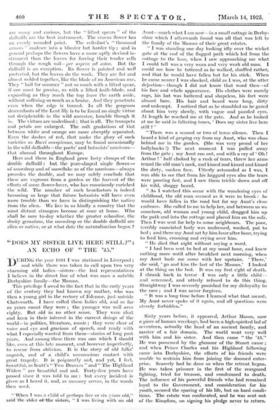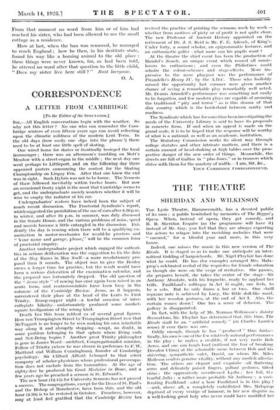"DOES MY SISTER LIVE HERE sum, : AN ECHO OF
" THE '45."
DURING the year 188I I was stationed in Liverpool ; and while there was taken to call upon two very charming old ladies—sisters—the last representatives I believe in the direct line of what was once a notable Derbyshire family— the Masons. This privilege I owed to the fact that in the early years of the century they had knoWn my mother, who was then a young girl in the rectory of Edensor, just outside Chatsworth. I have called these ladies old, and so far as years count they were ; the younger was well over eighty. But old in no other sense. They were alert and keen in their interest in the current doings of the world—in politics, literature, music ; they were clear of voice and eye and gracious of speech, and ready with what I especially wanted from them--stories of long past years. And among these there was one which I should like, even at this late moment, and however ithperfeetly, to rescue from oblivion. It is the story of old folks' anguish, and of a child's unconscious contact with great tragedy. It is poignantly sad, and yet, I feel, beautiful, as Scott's " Two Drovers " and " The Highland WidoW " are beautiful and sad. Forty-five years have passed since it was told - to me ; but every incident is given as I heard it, and; as memory serVes, in the 'Words . then used.
"When I as a child of perhaps the or six years old," said the elder of-the sisters, " I was liVing with in old Aunt--much what I am now—in a-small cottage in Derby- shire which I afterwards found- was all that was left to the family of the Masons of their great estates. ' " I was standing one day looking idly over the wicket gate at the- end -cif the flagged path which led from the cottage to the lane, when I saw approaching me what I could tell was a very worn and very weak 'old inari. I could see how he tottered as he walked, shuffled rather, and that he would have fallen but for his stick. When he came nearer Twas shocked, child as I was, at the utter dejection—though I did not know that word then—of his face and whole appearance. His clothes were merely rags, his hat Was battered and shapeless, his feet were almost bare. His hair and beard were long, dirty and unkempt. I noticed that as he stumbled on he gazed about him very slowly, with vague and puzzled eyes. At length he reached me at the gate. And as he looked at me he said in faltering tones, ' Does my sister live here still ? '
" There was a second or two of tense silence. Then I heard a kind of gasping cry from my Aunt, who was close behind me in the garden. (She was very proud of her hollyhocks !) The next moment I was pulled away from the gate ; my Aunt ran out, and with a cry of ' Oh ! Arthur ! ' half choked by a rush of tears, threw her arms round the old man's neck, and kissed and kissed and kissed the dirty, sunken face. Utterly astounded as I was, I was able to see that from his haggard eyes also the tears Were pouring fist, and I saw them trickle down and off his wild, shaggy beard.
" As I watched this scene with the wondering eyes of childhood, the old man seemed as it were to break : he would have fallen in the road but for my Aunt's close embrace. She called to me to help her, and between us we somehow; old woman and young child, dragged him up the path and into the cottage and placed him on the sofa. Then I was sent for help to some neighbours. The poor, terribly emaciated body was undressed, washed, put- to bed ; and there my Aunt sat by him hour after hour, trying to feed him, crooning and crying over him. " He died that night without saying a word. " I had been sent to bed. at my usual hour, and knew nothing more until after breakfast next morning, when my Aunt bade me come with her upstairs. ' There,' she said, ' gO and kiss the last of the Masons.' I looked at the thing on the bed. It was my first sight of death. I Oliank back in terror—I was only a little child— and screamed, and utterly refused to do this thing. Straightway I was severely punished for my disloyalty to the race ; and I was never forgiven. " It was a long time before I learned what that meant. My Aunt never spoke of it again, and all questions were sternly forbidden."
Sixty years before, it appeared, Arthur Mason, now a pieee of human wreckage, had been a high-spirited lad of seventeen, actually the head of an ancient family, and master of a fair domain. The world went very well with him and his sister. And then came " the '45." He was possessed by the glamour of the Stuart cause ; and when Prince Charles and his Highland following came into Derbyshire, the efforts of his friends were unable to restrain him from joining the doomed enter- prise. Scarcely had he done so when the retreat began. He was taken prisoner in the first of the rearguard fighting, tried for treason, and condemned to death. The influence of his powerful friends who had remained loyal to the Government, and consideration for his youth, secured the sparing of his life, but on hard condi- tions. The Estate was confisecited, and 'he was sent out , . of the Kingdom, on signing his pledge never to return, From that moment no word from him or of him had reached his sister, who had been allowed to use the small cottage as a residence.
How at last, when the ban was removed, he managed to reach England ; how he then, in his destitute state, found his way like a homing animal to the old place : these things were never known, for, as had been told, he uttered no word after that question to the little child, " Does my sister live here still ? " Sant lacryntae.
0. A.















































 Previous page
Previous page